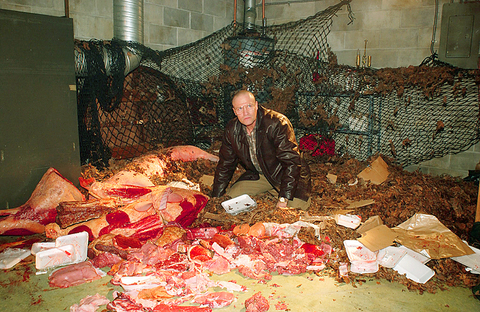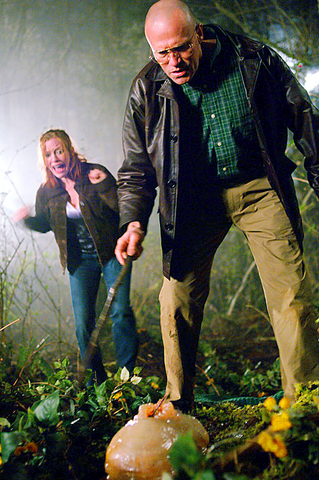The slinny little creatures that wiggle into the mouths of the seriously freaked-out characters in the horror film Slither are meant to have originated in space. In truth, these delightfully repellent critters, which look like fast-moving leeches, squirmed out of the brainpan of the film's writer and director, James Gunn, a horror savant who has obviously put in some time with the collected works of both George Romero and David Cronenberg. Romero's zombie nation lives in shadow form in Slither, a film about a fecund extraterrestrial with an insatiable appetite for flesh. But it's Cronenberg's early career interest in oozing orifices and spiky protu-berances that seems to have left the biggest impression on Gunn.
There are plenty of orifices, protuberances and ooze in Slither, along with enough raw meat to suggest that despite the usual disclaimer about no animals being harmed during this production, PETA will soon be on the march. The monster that spawns all those slithering creepy-crawlers has a cattleman's appetite for filet mignon. (What's for dinner? A cow.) The monster also has a taste for cat and dog, and a deep affection for the little lady its host body, a small-town tough named Grant Grant (Michael Rooker -- Henry in Henry: Portrait of a Serial Killer), was forced to leave behind. Her name is Starla Grant (Elizabeth Banks), and her smile still shines bright even after her husband, Grant, has transformed into a fairly unnerving Jabba the Hutt look-alike. "Marriage," she says, "is a sacred bond."
So are movies, or that's the idea, anyway. The pleasure of horror isn't simply that the best films make your toes curl and force you to check the locks, but that they require a particularly strong connection between the audience and the director. Like comedy, horror is difficult to master because it requires nuance. So many contemporary horror films just pour on the blood and sadism; it's absurdly easy to grab the audience's attention simply by sawing off an arm. Real horror demands more than a romp in a charnel house; it requires dread, mystery, awe. It also requires that the audience, a tough crowd well accustomed to all manner of aestheticized butchery, suspend its cool long enough for a director to deliver the goods.

PHOTOS COURTESY OF FOX MOVIES
Gunn is credited with writing the very good remake of Romero's zombie classic Dawn of the Dead, which shouldn't have worked but did because it both followed the genre rules and bent them, mostly by making the zombies move frighteningly fast, just as they do in Danny Boyle's 28 Days Later. The accelerated pace might have seemed heretical (and Romero himself remains a firm adherent of the slow-moving undead), but it was just the kind of tweak that can make a familiar setup seem fresh. In similar fashion, while Slither sometimes feels like a monster-mash, what makes it work is how nimbly it slaloms from yucks to yuks, slip-sliding from horror to comedy and back again on its gore-slicked foundation.
The humor tends to skew toward the obvious and goofy, though some of the best jokes are also the more understated, as when the would-be hero chief of police, Bill Pardy (the very fine Nathan Fillion, late of Serenity), on his way to a showdown with the monster with a posse of heavily armed deputies, pauses to lock his car with a chirping remote key. This small, inane gesture effectively puts the action on pause, drawing out the tension, and underscores the ordinariness of the designated good guy (even while suggesting that he may not be quite up to the challenge). It also makes you think about logistics, a critical component of a genre that demands a certain pragmatic savvy from its characters.
The characters who make it out of a horror film alive seem to come equipped with a kind of survival manual: they know how to plunge a stake through the vampire's heart and when to fire a silver bullet. The men and women in Slither seem fairly hapless by comparison: their guns don't do the trick, and the grenade the police department keeps locked away looks as if it's been gathering dust since the fall of Saigon. Gunn doesn't seem interested in stirring the pot with politics, but not long before the big finish, Bill turns to a teenage girl (Tania Saulnier) and tells her how, when it's all over, he will need to be remembered as the hero of this story. Even as the monster stands poised to wipe out the town, this guy is thinking only about his image.

Slither
Directed by: James Gunn
Starring: Nathan Fillion (Bill Pardy), Elizabeth Banks (Starla Grant), Gregg Henry (Jack MacReady), Michael Rooker (Grant Grant) and Tania Saulnier (Kylie Strutemyer)

Running time: 96 minutes
Taiwan Release: Today

June 2 to June 8 Taiwan’s woodcutters believe that if they see even one speck of red in their cooked rice, no matter how small, an accident is going to happen. Peng Chin-tian (彭錦田) swears that this has proven to be true at every stop during his decades-long career in the logging industry. Along with mining, timber harvesting was once considered the most dangerous profession in Taiwan. Not only were mishaps common during all stages of processing, it was difficult to transport the injured to get medical treatment. Many died during the arduous journey. Peng recounts some of his accidents in

“Why does Taiwan identity decline?”a group of researchers lead by University of Nevada political scientist Austin Wang (王宏恩) asked in a recent paper. After all, it is not difficult to explain the rise in Taiwanese identity after the early 1990s. But no model predicted its decline during the 2016-2018 period, they say. After testing various alternative explanations, Wang et al argue that the fall-off in Taiwanese identity during that period is related to voter hedging based on the performance of the Democratic Progressive Party (DPP). Since the DPP is perceived as the guardian of Taiwan identity, when it performs well,

The Taiwan People’s Party (TPP) on May 18 held a rally in Taichung to mark the anniversary of President William Lai’s (賴清德) inauguration on May 20. The title of the rally could be loosely translated to “May 18 recall fraudulent goods” (518退貨ㄌㄨㄚˋ!). Unlike in English, where the terms are the same, “recall” (退貨) in this context refers to product recalls due to damaged, defective or fraudulent merchandise, not the political recalls (罷免) currently dominating the headlines. I attended the rally to determine if the impression was correct that the TPP under party Chairman Huang Kuo-Chang (黃國昌) had little of a

At Computex 2025, Nvidia CEO Jensen Huang (黃仁勳) urged the government to subsidize AI. “All schools in Taiwan must integrate AI into their curricula,” he declared. A few months earlier, he said, “If I were a student today, I’d immediately start using tools like ChatGPT, Gemini Pro and Grok to learn, write and accelerate my thinking.” Huang sees the AI-bullet train leaving the station. And as one of its drivers, he’s worried about youth not getting on board — bad for their careers, and bad for his workforce. As a semiconductor supply-chain powerhouse and AI hub wannabe, Taiwan is seeing